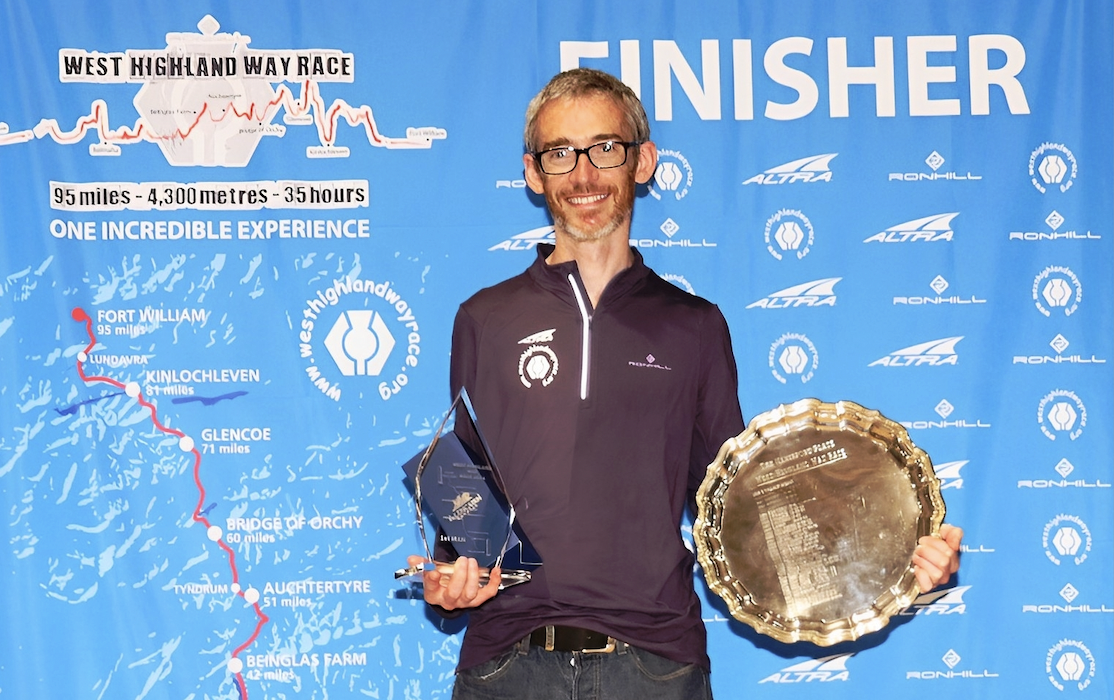We first spoke about this time, last year, sometime after the Yorkshire Three Peaks race.
You were building up to Lakeland 100 then. You’ve had some great results. I won’t go into them in detail, because I detailed them in my last chat. But briefly, for people who don’t know your background, you’ve had excellent results with a win and course record at the Lakes in a day, 50 miler in the Lake District in the autumn of 2022.
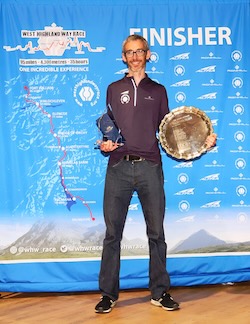
You won the Anglo Celtic Plate 100km in Northern Ireland in 2023. in a great time of 6:37:19. It was the first time the ACP was held in Northern Ireland. Then it’s won by a Northern Irishman. Then you ran Lakeland 100 in July, where you placed second to Andy Berry after leading most of the way and finished the year winning the Glasgow to Edinburgh canal race in October. So it’s fair to say you have a growing reputation on the ultra-distance scene. It’s generally acknowledgedthat you keep yourself, a bit under the radar.
JM. Yes, I suppose I’m not the most social media presence, so in that sense, I guess people maybe don’t see me until I show up.
AS. That’s not a bad thing to do. I remember reading an article with Jim Walmsley, about the year he won UTMB.
He credits some of his success to the fact that he went off social media for the two months before the race.
JM. That’s Interesting.
Moving up to 100 miles
AS. He just felt It was s just too much of a distraction and just wanted to concentrate on the race,
He did joke about it. At one point, He wanted to put the odd stunning session he was doing on Strava, but realised it was just his ego talking.
Anyway, Lakeland 100 was your first 100 miler. How did you personally find the move from the 50-mile/100k area up to 100 miles? Did you have to do a lot more volume to make yourself confident with the distance?
JM. Not really, to be honest, I’d say probably my best preparation for any race I’ve ever done was for the ACP 100km last year. I had a really good training block with no niggles or anything. Everything went really smoothly going into that. Ithink after that I started to pick up, little knee niggles and stuff and recovery out of that 100k was slower. Then I had another race in between so I had a wee bit of taper into it and stuff. So I think going into Lakeland 100, I was well prepared for my first 100.
Don’t get me wrong, I was running in good shape but I didn’t do any higher mileage. I probably did less mileage going into Lakeland 100 just because I’d been interrupted through tapers and recovering from little niggles. People who constantly go into these events are generally over-trained, so I guess I went into Lakeland in good shape.
Part of the appeal of doing Lakeland was to see how I would go over that sort of distance. I didn’t know how I would go in those later miles, but it worked out fine.
AS. I remember when we spoke last year, you don’t tend to go back to races again, but you like to seek out new races and new challenges. When did the West Highland Way first become a little idea on your radar?
JM I’d known about the West Highland Way as a trail for maybe a few years. My brother lives literally a few minutes walk from the start. So he lives up at Milngavie, so I’d heard of West Highland Way, but I didn’t really know about the race or anything like that. I think when I was starting to think about 100 milers or longer ultras, I began Googling races and the West Highland Way obviously being one of the most iconic, was right near the top of any list of 100 milers. So I knew about it, and then I think over the last couple of years I started listening to more podcasts and stuff and it kept recurring in various features. When you listen to the Young Hearts Run Free podcast, you can’t help but hear about it as they mention it a lot one. I think Lakeland probably was first on my radar, so I signed up for it, but you can’t do too many 100-milers in quick succession.
What would you say were the key lessons you learned from doing your first 100-miler which you thought might have been able to apply going into the West Highland Way?
JM. I think that’s interesting. I would say the one thing I learned more from the 100 miler than anything else I’ve done is you will go through phases and you can come out of those phases. At Lakeland 100, I went through various bad patches for various reasons and again, you come through those and can then be running well again. I think I went into West Highland Way knowing that even if things aren’t going well at some point, you know, that can change. Whereas I think when I’ve done shorter stuff, it almost feels like if it’s not going your way, that’s the end of your day.
My biggest takeaway from Lakeland was the final 5k to the finish didn’t work out the way I wanted, so maybe there was a lesson there for sure. I think that was more circumstance rather than actually something I’d done wrong, though maybe I could have been more aware of and maybe avoided that little blip
NOTE. Jarlath was a long-time leader of the Lakeland 100 but faded a little in the final 5km leaving a strong finishing Andy Berry to take the win.
The build up to West Highland Way
AS. You said you became aware of the West Highland Way as an iconic race. Were you aware of the race history and the fact that people like Rob Sinclair, Robbie Britton and Paul Giblin had all run very fast times on it? Did you get to a point where you might be competing with if, not with them, with their time zone, as it were?
JM If I’m honest, not initially. I had committed to doing it then when you’ve got through the ballot, you start to, you know, pay more attention and that’s when I then started to see some of the amazing times those guys have done. Youknow, you read about it and you hear about it. So I probably became more aware of the history after having committed to running it.
AS. As far as your own race went we talked a little bit about this after the race on Sunday, but you said you didn’t set off with a time in mind. What was your whole mindset as to how you were going to approach this? Did you just go by feel or just go with the leaders or whatever?
JM. I would say that’s my general approach, certainly for the longer stuff where I think it’s very hard to predict. I have no idea how you go about setting a pace on these things. So my general approach is to go to feel anyway.
Building up to the West Highland Way, I don’t know if you know the background, but I was injured in October when I had a stress fracture that took me out to January. Then I was getting back with a very slow build-up from a stress fracture, and I developed this sciatic nerve problem. It was initially on one side, and then it flipped to the other side. Just as I started to get back into running again. So my training from October to May was very interrupted.
It was really only towards the end of May, that I started to decide to go for it. I had a few weekends when, even though there were days during the week where I couldn’t run, I had a few good weekends where I got some long runs in and that was right at that end of May when you had to put in your crew details. It was only then that I really had a good weekend. If I hadn’t had a good weekend I wouldn’t have pulled out and wouldn’t have been running.
So I went into the race feeling totally undercooked if I’m honest and underprepared. I genuinely didn’t know whether I would make it to the end just through fitness. So my goal going in was just to, worry too much with the time. I suppose I am competitive, but I was kind of hoping that it didn’t go out too fast and I could just feel my way into it and see how it goes. If things are feeling good then, you know, I’ve got more in the tank to keep going. But I honestly had no expectations. I didn’t even have expectations in terms of how competitive I could be.
AS. So when you were injured, were you doing any cross-training at all? Were you able to do anything? Just keep your fitness up? Or were you just having a bit of a chill-out?
JM. So the one consistent thing I’d done was aqua jogging. Maybe about four or five times a week even. So veryconsistently for the best part of an hour, I would say, depending on how much time I could fit in before work. But usually about an hour, four or five times a week. That was the only consistent thing I did. My friend got me into a little bit of bike work, so I’d also done maybe a handful of 30 miles on a bike, which for me is a lot but not really a huge volume. Iwouldn’t really say that was proper cross-training, but I did do the occasional bit on the bike, plus the aqua jogging.
AS. Some will find it quite astonishing that you had quite a low background mileage through those four or five months.
JM. The Aqua jogging doesn’t feel like it’s doing much for you, but It must be because even before West Highland Way, I’d come back to training having not run for well over a month and even then, felt like the fitness was coming back within a couple of weeks.
I got a couple of weeks back and then the sciatic nerve kicked in on the other side and then I was out for another few weeks and training was stop-start a lot.
.AS. It’s Interesting as Ally McGill ( 2024 Ladies winner) also had an interrupted build-up. Not as bad as yours but the last five or six weeks building up to the race were challenging and at one point she wondered if she would make the start line.
JM. Maybe it takes the pressure off a wee bit too and you kind of just go into the race hoping more than expecting.
Comparing Lakeland 100 to West Highland Way
AS. We’ll come on to your race in a minute, but compare the West Highland Way with Lakeland. Lakeland has got far more climbing in it. I mean, you’re doing 100 miles and it’s taking you and Andy about 19, 20 hours,
West Highland Way, and you’re doing 95 miles and only running for 14 and a half hours or less. It’s obviously a more runnable course.
How would you compare Lakeland 100 with West Highland Way, if you can compare them at all?
JM. They are totally different races in some ways. They’re definitely very different. I would say I was less intimidated by the West Highland Way. If I had been going into Lakeland 100 at the weekend, I’m not sure I would have shown up on the start line because I would have felt like my preparation wouldn’t have been sufficient. I think I was less intimidated by the West Highland Way just because the Lakeland climbs are a bit tougher and it’s a bit longer. So definitely I think it’sharder.
I quite like the West Highland Way more because I actually enjoy the running. I find it frustrating when you can’t get into a rhythm. There’s the odd bit on the Lakeland you can do that but a lot of it’s kind of stop-and-start. Whereas the West Highland Way you get into a good flow, especially after you get past Auchtertyre. Even after Beinglass it starts to open up as a runnable course that that makes it so much better.
Having your own crew helps as well. My two friends, were both really good. It’s nice seeing someone you know every seven or 10 miles or whatever.
Also, they can adjust what you like with food and nutrition and stuff. At Lakeland, it was just kind of, showing up to checkpoints just hoping to take on whatever they had on offer, rather than have to carry all my food whereas at least this one I could plan every hour or so exactly what I wanted
AS. Psychologically, the difference between Lakeland being a big circuit, whereas the Highland Way is point to point.
AJ. Yes, I like the point-to-point, I must admit. I think that’s one of the nicest things about the West Highland Way. Itdefinitely gets more beautiful as you head north. Don’t get me wrong, I like down by Loch Lomond, but it opens up andyou start to see the mountains and the expansive landscapes and that’s really nice. So although I think we all, like Lakeland the course, The West Highland Way has something special about being point-to-point.
How the race unfolded at the front
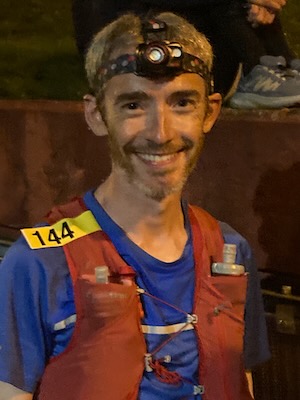
AS. So the race itself. You said you weren’t sure what the competition was going to be like. Had you checked out the other contenders?
JM.I feel almost embarrassed that I didn’t really.
I realise now that I raced against Sasha in the Yorkshire Three Peaks last year, where he had a great run and beat me well to finish second and I barely made the top ten.
Probably the only person I’d looked up was Robbie Dunlop. The reason was, I’d seen he was on the start line and I knew what time he’d run before. Not that I was going to set out at his pace, but in terms of helping my crew, figuring out when I might be at certain points and knowing how much time was between checkpoints in terms of figuring out nutrition and stuff. I was using his 16-hour splits as a rough guide, like as a starting point. So probably Robbie was the only one I paid attention to pre-race.
I did read your preview blog but I never really clocked all the names.
AS. Sasha (Sasha Chepelin) took it out quite hard, which made it interesting.
JM. It didn’t go out super hard to be fair to him, it was still fairly comfortable and I’m sure for him, with his basic speed, it was super comfortable.
I think for me personally, as I said earlier, I went in hoping it would start out slow and then suddenly he went off the front. I suppose the competitive part of me didn’t want him to go out of sight because then you never know how far away they are until you’re meeting your crew. So I tried to get closer to him but never actually got that close so he wouldn’t feel like I was pressurising him to go faster. Then eventually, I don’t know if he deliberately slowed down but I almost naturally had to come up to him. Then we were chatting. I said,
“It’s a long way to go. This is like 10 miles in, here or something. I was trying to say, anything’s going to happen.
He did say something like, “Oh,.I’m not sure what pace we should be going with so much further to go. He hung in there well to finish though.
AS. Yes. some good people, having a bad day did bale out.
JM. YES. I respect that he and others like him kept going even if it’s not quite their day.
AS. Sasha dropped back and then looking at the time splits, you and Robbie seem to be running pretty much together for quite a long stretch up the lochside and right up to Bridge of Orchy.
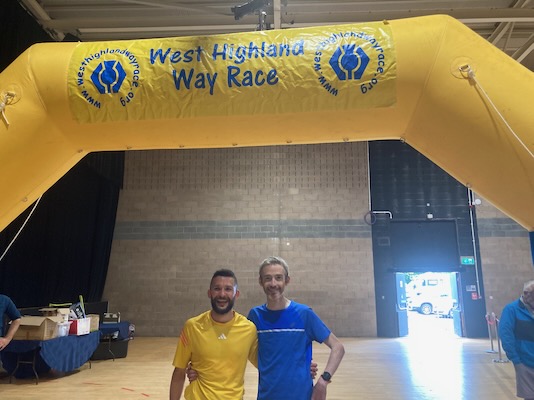
JM. I would say Robbie was almost dragging me along at times. We were running fairly comfortably together till to Rowardennan and then I lost track of actually where he was. I didn’t know whether he left the checkpoint before me or after me because I stopped with my crew to have a wee bit of a bite. It turned out he was ahead of me. So I came out of Rowardennan, and I was expecting to see people in front of me and then I couldn’t see anyone. And then I saw Sage. Anyway, I came across Sage ( Sage Pearce-Higgins who finished 4th. He said Robbie had dropped him so I knew then Robbie was ahead. Anyway, I caught up with him. Robbie was really good actually, going around that more technical bit on the loch side. I was just enjoying that bit too but I was kind of keeping with him.
Then from Beingass onwards, I felt like I was struggling a wee bit actually and I think Robbie maybe wasn’t running totally himself either because some of those little inclines we were both power walking up. There was one period I remember things did go very, quiet. Like we had been chatting away. Robbie’s a really nice guy. He’s chatting away, but there’s one period we went really quiet for a few minutes and then something clicked and, I don’t know, we started chatting again and he was like, “Oh, I’m really glad we’re talking again, that was really hard work for a while. So he was struggling a wee bit too, but then we got to Auchtertrye and we both took a good stop there and I almost felt like I was waiting for Robbie to leave because I wanted to have the company. Then we came out of Auchtertyre and before the checkpoint I was feeling bad up to that point and had been sick but the wee stop there, for me, totally changed my race.Suddenly my running came back to me and Robbie dropped me a little bit as I was sick, again, but I caught up with him in no time. From Tyndram onwards, I didn’t deliberately try to drop him or anything, but I was running well. I was almost surprised he was still with me at Bridge of Orchy. I thought he must be running well again because I felt I ran that stretch really well. But then we came out of Bridge of Orchy and that little uphill bit and I knew I felt like I was running uphill and I knew earlier he was certainly walking more of the uphills. So from there I just felt good and just pressed on.
I didn’t try taking on too much solid food which I think was the problem I had earlier. I just literally stuck with Coke from there to the finish.
AS. We had an unfortunate incident with the accident closing the main road through Glencoe. Was that an issue for your support or were you just ahead of things?
JM. No, I think Robbie and I were ok but Sage’s crew were affected,
AS.So what’s the point when you realised Robbie wasn’t coming back to you and all being well you would win?
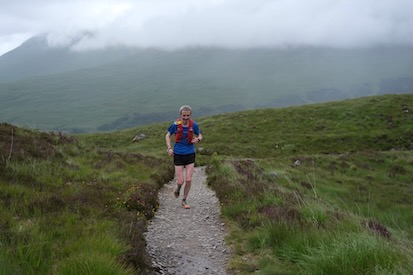
JM. Ay Bridge of Orchy,(60 Miles) I knew he was still very close. When we got to Glencoe(70 + miles), my crew said there was a five or six-minute gap from the tracker but hard to tell exactly.
So I thought, “Well, I’ve opened a wee bit of a gap there” I ran to the Devil’s Staircase well from there and up and over to Kinlochleven. I think my crew said then I maybe had a 12-minute lead or something. I thought, “Well, unless my legs fall apart for me this is looking good “.
JM. Yes. hey were all excellent. The Beinglass one was probably my highlight. I don’t know what they were on, but they were good fun. I was with Robbie at the time, and we were sort of joking with them. That was a really good buzz to keep you going/
The last one at Lundavra, they really gave you a lift as well. I think there you can sort of sense the finish and the marshalls were in good form as well.
But all the checkpoint crews were, so encouraging and helpful.
AS. So you get through Lundavra and onto the last little stretch.
You go through the forest and all those little few steps and stairs and that final little pesky little climb up to the fire road.Then you’re on that fire road and you can see “The Ben” ahead of you. You can more or less smell the finish but then you have that wonderful little five km down the fire road and into Fort William to the finish.
JM. It was good. Once I hit that fire road, as you say, it opens up and you know it’s downhill to the finish. The legs were running well, and it was a nice feeling.
To be honest, that was probably the first time I looked at my watch, and then I was like, “Oh. Look at the time.” I knew I wasn’t aiming for Rob Sinclair’s record, but I knew Paul Giblin’s time was around 14:20. I didn’t know it exactly. Thatalmost gave me a mini target and kept me working.
AS. Coming into the finish and realising you had won the West Highland Way. Try and sum it up to us what that feeling is.
JM. It was great. I saw my crew at the car park just as we were cutting across, and they shouted,” Come on”. That was just a nice buzz, and I was stupid and was sprinting for some reason. Not that a few seconds made any difference to my time, but it was just that adrenaline rush I got. I was running well, and coming into that hall and crossing that line with the banner was a nice feeling.
AS. Having done 100 milers, a question people often ask, or people don’t pay enough attention to is, how long do you give yourself to recover from an effort like this?
JM. That’s a good question. I’m entered for the Lakeland 50. I got a place at Lakeland 100 again, but I thought another 100 miles so close would be too much. I thought a 50 might be more manageable. So I’ll give myself the next two weeks to see how I feel. I’m feeling much better now than I did after Lakeland 100. The Lakeland 100 took a lot out of me last year. The day after the West Highland Way, I managed to get some proper food in me the day after the race, whereas Lakeland took me a few days to actually eat some proper food.
So everyone recovers differently, but 100 milers do need respect and recovery before pushing hard again.
What’s Next for Jarlath.
AS. Looking ahead, you mentioned before that you like seeking out new challenges. Do you have any must-do races on your bucket list, either at home or abroad? Do you have any inclinations to go abroad and challenge yourself against the Europeans or anything like that?
JM. To be honest, abroad doesn’t appeal to me. At the moment, I’m not saying that won’t change. There’s enough on my UK doorstep I’d like to try here first. At the moment, that international appeal doesn’t register. Things may change.
In terms of a bucket list, I would love to try a backyard ultra, just to see what that’s about. It’s a totally different can of worms, but I like having a different experience.
AS. Or maybe a 24-hour.
JM. I think that’s a good idea too.
That’s certainly another possible option. I’m open to trying things.
Some of those really long races give me a little bit of an itch too. The hearts saying, “Yes. Let’s do it.” and the heads saying, “No, don’t be stupid.”
So, I wouldn’t rule anything out. The other thing with the 100-milers and more is you can’t squeeze too many of those really long distances in.
AS. OK, on that note, I will leave you to go back to your family now.
JM. Nice to speak to you, and nice to see you again. And full appreciation to yourself, Ian and the rest of the team for putting on the event for us. I get the sense there’s a real family community feel to it, which is the other nice thing about it.
More reading
Read Scottish Athletics 2024 West Highland Way race report HERE
You can ready previous interview with Jarlath McKenna HERE
PLEASE SHARE!
Thanks for reading . If you have enjoyed this post, do see our other ones HERE
If you have a comment, please feel free to add it below.
If you are inspired by this or think someone else you know will be, please do what you have to do by sharing. You all know how these things work by now:-) You can also follow me on Twitter and Instagram @tarittweets
Sign up to receive our newsletter alerting you to new posts
Adrian Tarit Stott.
The author is a former GB 24 hour ultra international with over 100 ultra race completions. He has also been involved organising ultra distance races for over 30 years. Still an active recreational runner, he is currently a member of UKA’s Ultra Running Advisory Group (URAG) and part of the selection and team management for both Scottish and GB ultra teams.He is also a freelance writer in his spare time, contributing articles and reports to several websites and magazines including Athletics Weekly and Irunfar.
